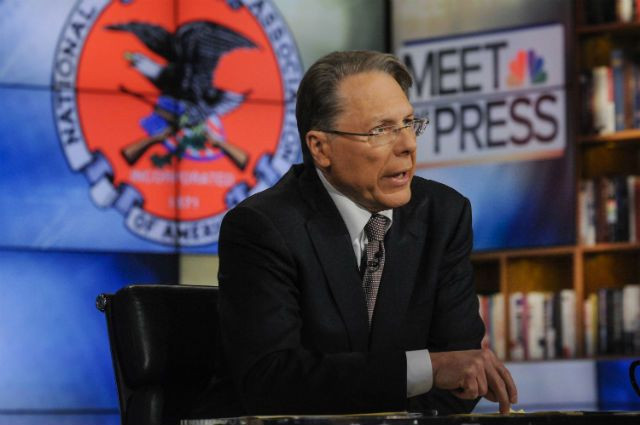
The leader of the gun lobby on Sunday defended his call for placing armed guards in all American schools despite withering criticism of the group's response to the massacre of 20 first-graders in Newtown, Connecticut.
"If it's crazy to call for putting police and armed security in our schools to protect our children, then call me crazy," National Rifle Association Chief Executive Wayne LaPierre told NBC's "Meet the Press."
The NRA waited a week before issuing a statement on the December 14 killings of the children and six adults at Sandy Hook Elementary School by a gunman who opened fire with a semi-automatic assault rifle.
LaPierre's speech on Friday in Washington drew protesters and stoked the fierce debate over U.S. gun laws in a nation with a culture of gun ownership and a history of school shootings and other gun violence.
The proposal to place armed guards in every school, an idea the NRA has long supported, drew the most criticism.
The congressman from Newtown's district, Chris Murphy, tweeted: "Walking out of another funeral and was handed the NRA transcript, the most revolting, tone deaf statement I've ever seen."
The New York tabloids skewered LaPierre's speech. The Daily News labeled him "Craziest Man on Earth" in a front-page headline on Saturday. The New York Post piled on with "Gun Nut! NRA loon in bizarre rant over Newtown."
The NRA's proposal was also attacked by politicians including New York Mayor Michael Bloomberg, the nation's largest teachers union and Mark Kelly, the husband of former U.S. Representative Gabrielle Giffords, who was hurt last year in a mall shooting by a gunman in Tucson, Arizona.
But LaPierre was undaunted.
"I think that is the one thing that we can do immediately that will immediately make our children safe," he said.
'GONNA BE A BATTLE'
LaPierre scoffed at the idea that reinstating the federal assault weapons ban that lapsed in 2004 would prevent more massacres, citing shootings that took place when the ban was in effect, including the 1999 Columbine High School massacre in Colorado.
"It's not going to make any kid safer," he said.
Republican U.S. Senator Lindsey Graham made the same point earlier on Sunday in a tweet: "The assault weapons ban didn't work then and it won't work now."
On NBC, Graham said he himself owns an AR-15, the type of assault rifle used by 20-year-old Adam Lanza in Newtown.
"I own an AR-15. I've got it at my house. The question is if you deny me the right to buy another one, have you made America safer?" he asked. "I don't suggest you take my right to buy an AR-15 away from me because I don't think it will work, and I do believe better security in schools is a good place to start."
Other gun rights advocates in Congress showed a willingness to consider new gun restrictions immediately after the Newtown shooting. U.S. lawmakers have not approved a major new federal gun law since 1994.
"It's gonna be a battle," Senator Joe Lieberman of Connecticut told CNN's "State of the Union."
He and Senator Charles Schumer of New York criticized the NRA for blaming gun violence on everything but guns.
An attempt to prevent shootings in schools without talking about guns "is like trying to prevent lung cancer without talking about cigarettes," Democrat Schumer said on NBC.
Also receiving scrutiny is a ban high-capacity magazines that allow shooters to fire multiple rounds in a short amount of time. They have been used in several mass slayings.
Graham, of South Carolina, said on NBC he opposes that move as well.
Minnesota Senator Amy Klobuchar, a Democrat, said on ABC's "This week" that "putting some limits" on high-capacity magazines "could be part of the solution, but not the only solution." A former prosecutor, she also called for more stringent background checks of gun buyers.
The Obama administration was expected to propose steps next month to tighten gun laws.
© Thomson Reuters.




